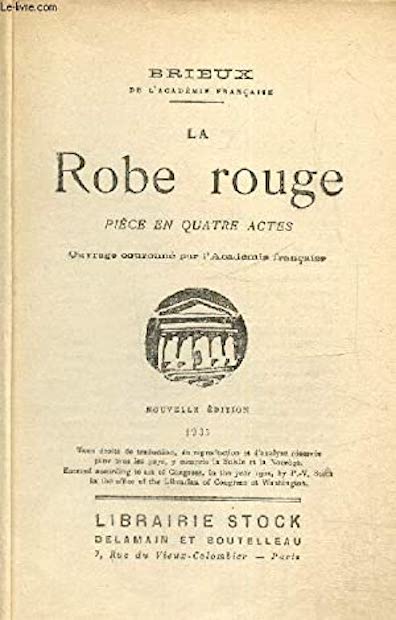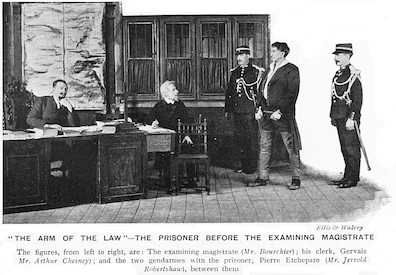In Proteus Stephen thinks that he "used to carry
punched tickets to prove an alibi if they arrested you for
murder somewhere. Justice. On the night of the seventeenth of
February 1904 the prisoner was seen by two witnesses. Other
fellow did it: other me. Hat, tie, overcoat, nose. Lui,
c’est moi. You seem to have enjoyed yourself." The
perforated tickets are probably for the theatre, to show he
spent an evening in public view, because the date that Stephen
gives coincides with a newpaper report of a French play about
mistaken identity.
On 17 February 1904 the Irish Independent reported on
an English version of a French play about a man wrongfully
accused of murder. The Arm of the Law, which became a
major hit at the Garrick in London starting in mid-February
1904, translated a French original, La Robe Rouge. Might
Joyce have seen the original in Paris? "You seem to have
enjoyed yourself" suggests that he may have done so,
which would reward anyone who discovers the 17 February 1904
newspaper reference.
The red robe of the French title refers to achieving the role
of prosecuting advocate. In the drama, an innocent man is
accused, and his wife, under cross-examination as she tries to
help her husband, discloses that she previously had an affair,
unknown to him. The husband is acquitted but repudiates his
spouse for her infidelity and takes their children with him.
She takes revenge by murdering the prosecutor with a knife,
thus committing the crime of which her husband was innocent.
Given Joyce’s fascination with uxorial betrayal (in real life
as in Ulysses), this play would seem to make
perfect fodder for his art. Stephen's "punched tickets"
anticipate the torn-up betting tickets that Bloom finds in his
home in Ithaca, which suggest Molly's unprofessional
engagement with Boylan.
Wrongful accusation too is a major theme in Ulysses,
and this is its first appearance. In Circe, Bloom too
imagines himself being “Wrongfully
accused” in connection with a theatrical production, The
Lyons Mail, which tells the story of a man who was
arrested and executed for murder because he looked very much
like one of the accomplices in the crime. As Stephen says, in
words that strikingly evoke that other play, "Other fellow
did it: other me. Hat, tie, overcoat, nose. Lui,
c’est moi."


